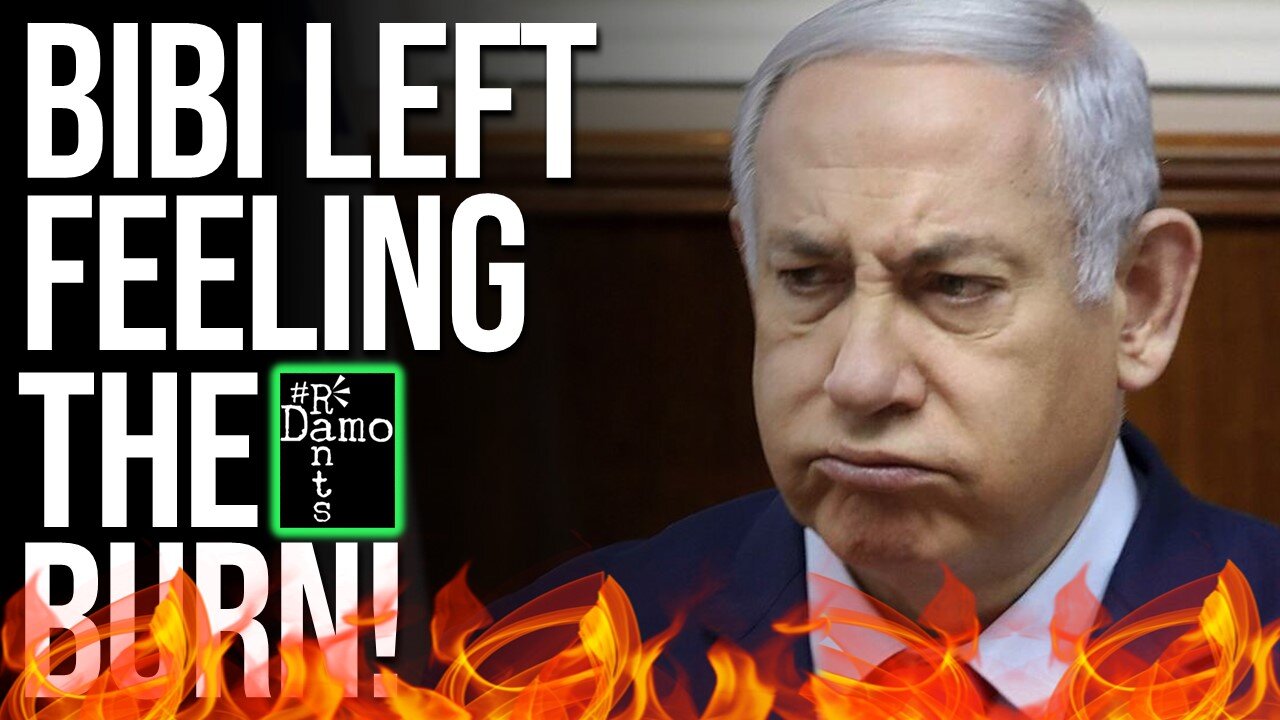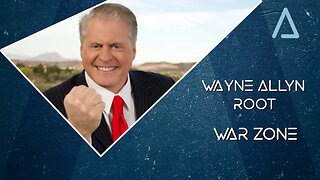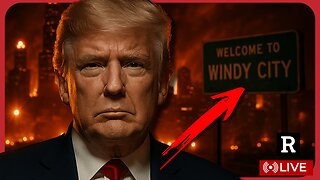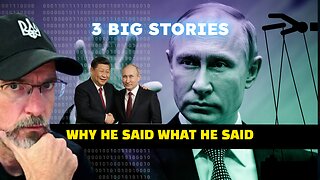Premium Only Content

Netanyahu Sets Syria Ablaze – Only to Get Burned Himself!
Right, so it takes a special kind of political genius to bomb people in the name of saving them. Ahmed al Sharaa, better known as the former al-Qaeda operative al-Jolani the HTS-commander-turned-president, now dresses up his old authoritarian instincts as humanitarian concern, proclaiming that “protecting the Druze” is his noble mission, despite having targeted minorities incessantly since seizing power in Syria. Benjamin Netanyahu, ever the opportunist, has discovered an equally miraculous conversion: between courtroom appearances in his corruption trial, he has taken time to become the Druze’s self-appointed saviour—by flattening Damascus with airstrikes. The cynicism is so thick it could be carved into marble. Two men, supposedly ideological enemies, have found common ground in using Druze suffering as political currency. One wants to tighten his grip on Syria; the other wants to cling to power in Israel. Meanwhile, the only people who are not being saved are the Druze themselves.
It is very easy in the West, where we have observed so much Middle Eastern warfare that this is just yet another Middle Eastern skirmish. This one is different though, this one is a study in calculated hypocrisy from both sides of the equation, a grim reminder that “humanitarian concern” is too often a euphemism for propaganda and self-preservation. This is a story of how a local economic protest became a regional proxy war, how two leaders wielded the language of protection while dealing out destruction, and how civilians, yet again, end up paying the highest price.
Right, so the Suwayda conflict, which began as a local economic and political protest, has been weaponised by both men into a regional confrontation to suit their respective repressive agendas. It has provided Israel with a convenient pretext for its most significant strikes on Damascus in years and offered Sharaa an opportunity to crush dissent under the guise of counter-terrorism. Meanwhile, the Druze—the very people invoked by both sides as justification—find themselves shelled, displaced, and killed in the name of their supposed “protection.”
Contrary to the official narratives emanating from Damascus and Tel Aviv, the Suwayda crisis was not born of sectarian hatred or extremist infiltration. Its origins lie in the worsening economic conditions that have plagued Syria since the fall of Bashar al Assad and Sharaa’s rise to power in December of last year. Rampant inflation, fuel shortages, and chronic unemployment hit Suwayda particularly hard. The Druze, long accustomed to a degree of autonomy under both Assad and his predecessors, as I spoke about in a video yesterday, saw their living standards collapse while simultaneously facing new demands for loyalty to Sharaa’s interim government.
By late June, demonstrations had erupted across Suwayda. Protesters demanded fuel, food, and greater local autonomy under the Suwayda Military Council, which had become the de facto authority in the region during the chaotic final years of Assad’s rule and beginning of Sharaa’s. Initial protests were peaceful, but Sharaa’s response transformed them into a full-blown conflict. Sharaa, ever the religious extremist, dispatched elite units to Suwayda to impose “order.” Villages were shelled, community leaders arrested, and entire areas placed under punitive blockades. Reports indicated that hundreds of civilians were killed in these early crackdowns, and the humanitarian situation deteriorated rapidly.
The framing of protests as “terrorist infiltration” was a strategic choice. It allowed Sharaa to delegitimise local grievances and present himself to international partners, particularly the United States and Gulf States, as a bulwark against extremism. It also justified the deployment of government-aligned militias, many drawn from Bedouin tribes historically hostile to the Druze over control of smuggling routes and land. This added a combustible local rivalry to an already volatile situation. So what began as an economic protest was recast by Sharaa and these anti-Druze elements as a security crisis, allowing Sharaa to pursue his long-term goal of integrating Suwayda fully into Damascus’ authority, tolerance of dissent and autonomy not on his agenda.
Sharaa’s claim to prioritise the protection of the Druze therefore, repeated in interviews and official statements, is breathtakingly disingenuous when measured against his government’s recent record. His forces have shelled Druze villages, displaced thousands, and arrested community leaders under the pretext of counter-terrorism. In Suwayda alone, more than 3,000 people have reportedly been displaced since the crackdown began.
This hypocrisy is not limited to Suwayda. Sharaa’s interim government, formed from his HTS group, al-Qaeda in Syria by another name as that is, has continued to persecute minorities in other parts of Syria. Christians and Alawites in western Syria have faced property seizures, mass arrests for resisting central authority and in the case of the Alawites certainly, massacres. In Idlib and other northern areas, HTS-linked militias operating under Sharaa’s nominal control have harassed Yazidi and Christian communities, undermining his claims of a new, inclusive government.
Sharaa’s sudden embrace of minority rights therefore, is a bit hard to swallow, it appears to be a carefully calculated public relations strategy. With the United States and Gulf States offering reconstruction aid contingent on distancing Syria from Iran, portraying himself as a moderate protector of minorities is politically expedient. His messaging also serves to undermine Israel’s justification for airstrikes; if Damascus can plausibly claim to be safeguarding Druze rights, then Netanyahu’s strikes look like aggression rather than humanitarian intervention.
Yet for the Druze, Sharaa’s “protection” has meant being shelled by the army on one day and used as a propaganda tool the next. His words are less a commitment to minority rights than an attempt to secure legitimacy abroad while consolidating power at home.
If Sharaa’s hypocrisy is cynical though, Netanyahu’s actions border on the strategically irrational. Ahmed al Sharaa has signalled openness to diplomatic engagement with Israel, my God has he ever, marking a stark departure from Assad’s hostility and pro-Iran proclivities. Yet Israel has responded not with diplomacy, but with its most significant strikes on Damascus in years, including a direct hit on the Defence Ministry building that killed and injured dozens.
Despite Sharaa repeating ad nauseum he wants to be friends with Israel, particularly not withstanding the aid Israel have given to HTS over the years to oppose Assad, the explanation lies in Israel’s long-standing security doctrine, legislative paranoia as that is, which prioritises maintaining weak and divided neighbours over cultivating stable relations, in order that Israel can stand alone and stand strongest. A diplomatically rehabilitated Syria under Sharaa could one day muster the legitimacy to demand the return of the Golan Heights, which Israel annexed illegally decades ago, yet which Sharaa has offered up on a plate to Israel for normalisation. Keeping Syria fractured and its leadership discredited serves Israel’s long-term strategic interests far more than entertaining the possibility of peace does, just one more reason why the genocidal apartheid state is an absolute pariah.
Netanyahu’s domestic political troubles add a personal incentive to escalate as well. His corruption trial still looms large and it’s a case of finding any excuse to kick it down the road. His coalition, has also been fractured with the departure of United Torah Judaism over the Haredi Draft Bill to conscript ultra-orthodox Jews into the army, traditionally always exempted, now also having been followed out of the coalition door by fellow ultra-orthodox party Shas, leaving Netanyahu with a coalition minority government that will struggle to persevere. By bombing Damascus under the pretext of humanitarian protection for Druze communities, Netanyahu achieves two objectives: he dominates the news cycle with security headlines and reassures those coalition partners that he remains “Mr Security.” The humanitarian narrative plays well in Western capitals, excusing their ongoing Israeli support while at home it distracts from corruption and government instability.
This is not the first time Netanyahu has used military action as a political distraction. His 2019 Gaza escalation coincided with early corruption hearings, and his 2021 covert strikes in Syria followed weeks of domestic protests. The Suwayda crisis provides yet another convenient battlefield for Netanyahu’s political survival.
The United States’ role under Donald Trump adds another layer of contradiction to the crisis. Washington is simultaneously supporting Sharaa and Netanyahu, despite the two effectively waging war against each other as they play a dishonest version of tug-of-war with the Druze. On the one hand, Trump’s administration has offered reconstruction aid and diplomatic engagement to Sharaa to keep Syria out of Iran’s orbit. On the other hand, it continues to supply Israel with intelligence and military hardware, effectively greenlighting Netanyahu’s strikes on Damascus.
This balancing act is driven by cold pragmatism. Sharaa is useful as a local enforcer against Iranian interests, while Israel remains America’s key regional ally and the primary counterweight to Iran. The contradiction is ignored because it serves US strategic interests to keep both leaders dependent on American support.
However, the policy is not without risk. Sharaa’s humiliation at the hands of Israeli airstrikes, tolerated by Washington, could push him back toward others, Turkey arguably the likeliest, involved in helping Syria write a new constitution and with interests of its own in northern Syria, though Russia too potentially. The longer the US tries to maintain a position of contradiction, the greater the likelihood that it will eventually be forced to choose sides.
The Suwayda crisis has drawn predictable reactions from regional and international actors. Turkey has condemned Israeli strikes as a violation of Syrian sovereignty, positioning itself as a mediator while pursuing those northern interests of theirs in suppressing Kurdish militias along the border. The Gulf States have been divided, with Saudi Arabia and the UAE offering cautious criticism of Israel while quietly funnelling reconstruction aid to Sharaa as part of their broader strategy to curb Iranian influence and secure themselves, also a somewhat contradictory position since the Saudis are in talks these days with iran themselves, but that’s another story.
The Arab Parliament has issued the strongest condemnation, calling Israel’s actions a flagrant violation of sovereignty and demanding international intervention. Iran, has seized on the crisis to say that the attack had been “all too predictable”, adding that Iran supported the “sovereignty and territorial integrity” of Syria, more aimed at the people of Syria than Sharaa, who opposes Iran, Western puppet that he is. The United Nations has responded with predictable calls for restraint, while once again sitting on their hands.
While leaders debate strategy and power, civilians are paying the highest price. The Druze of Suwayda are caught between Sharaa’s authoritarian crackdown and Israel’s airstrikes, their villages shelled by the very government claiming to protect them and those who claim to want to save them. Urban civilians in Damascus have suffered as Israeli missiles strike government and civilian infrastructure alike, killing dozens and injuring many more.
The greatest irony is that both Sharaa and Netanyahu continue to invoke humanitarian language even as their actions exacerbate the suffering of the people they claim to defend. The Druze have become pawns in a geopolitical game where their lives are expendable, their suffering little more than a propaganda tool.
The ceasefire that has come into force has brought a temporary halt to the worst violence. Under the agreement, Syrian forces have withdrawn from Suwayda city, with local Druze-led security forces assuming control. For now, the truce is holding, but its longevity is doubtful. Netanyahu’s political survival depends on periodic escalations somewhere to keep his domestic agenda afloat. Sharaa remains committed to reasserting full central control over Suwayda, it is Syrian territory after all, but will strip it of its autonomy in favour of his own religious extremism, which will inevitably reignite local resistance.
The ceasefire, therefore, is less a genuine step toward peace than a temporary pause while regional powers reposition and leaders calculate their next moves.
The Suwayda crisis reveals the cynical nature of modern Middle Eastern power politics. The Druze are not being protected; they are being used. Sharaa invokes their protection to legitimise his authority, while Netanyahu uses their suffering as a distraction from his corruption trial. Trump’s America simultaneously backs both leaders, playing a contradictory game designed to maintain US leverage rather than achieve genuine stability.
This is not a conflict about minority rights or humanitarian concerns. It is about power—maintaining it, consolidating it, and surviving politically, regardless of the civilian cost. Until these fundamental dynamics change, no ceasefire will last, and no promise of protection will be anything more than propaganda.
As long as leaders like Sharaa and Netanyahu view war as a tool for political survival, and as long as global powers enable them, the people of Suwayda—and minorities across Syria—will remain pawns in a cynical and deadly game.
For more on this story and the Druze themselves, their autonomy and what is actually under threat here by both Israel and Syria, do check out this video recommendation here as your suggested next watch.
Please do also hit like, share and subscribe if you haven’t done so already so as to ensure you don’t miss out on all new daily content as well as spreading the word and helping to support the channel at the same time which is very much appreciated, holding power to account for ordinary working class people and I will hopefully catch you on the next vid. Cheers folks.
-
 LIVE
LIVE
Wayne Allyn Root | WAR Zone
5 hours agoWAR Zone LIVE | 2 SEPTEMBER 2025
47 watching -
 1:51:40
1:51:40
Redacted News
2 hours agoHIGH ALERT! TRUMP IS COMING FOR CHICAGO, U.S. TROOPS PREPARING INVASION TO STOP MURDERS | REDACTED
80.1K90 -
 LIVE
LIVE
Red Pill News
4 hours agoJustice Is Long Dead in The DC Circuit on Red Pill News Live
3,475 watching -
 1:17:50
1:17:50
Awaken With JP
4 hours agoTrans Shooter is the Victim, Vaccines in Trouble, and Greta is Ugly - LIES Ep 106
40.1K16 -
 2:04:31
2:04:31
Pop Culture Crisis
3 hours agoJK Rowling Calls Out HARRY POTTER Director, Sydney Sweeney Dating Scooter Braun? | Ep. 909
17.4K2 -
 1:02:42
1:02:42
Sarah Westall
3 hours agoRemote Viewers: Philadelphia Experiment, Alien Abduction and Future Events w/ the Rabbit Hole Group
4.24K3 -
 56:03
56:03
SGT Report
18 hours agoSILVER'S HISTORIC BREAKOUT -- Chris Marcus
32K10 -
 LIVE
LIVE
LFA TV
12 hours agoLFA TV ALL DAY STREAM - TUESDAY 9/2/25
1,167 watching -
 19:57
19:57
Professor Gerdes Explains 🇺🇦
4 hours agoDecoding Putin's Shanghai Narrative: The Strategic Goal Behind the Lies
3.98K1 -
 1:16:16
1:16:16
vivafrei
4 hours agoTrans Violence Canadian Media is IGNORING! Activist Judge vs. Trump AGAIN! Ostrche Update & MORE!
51.2K36